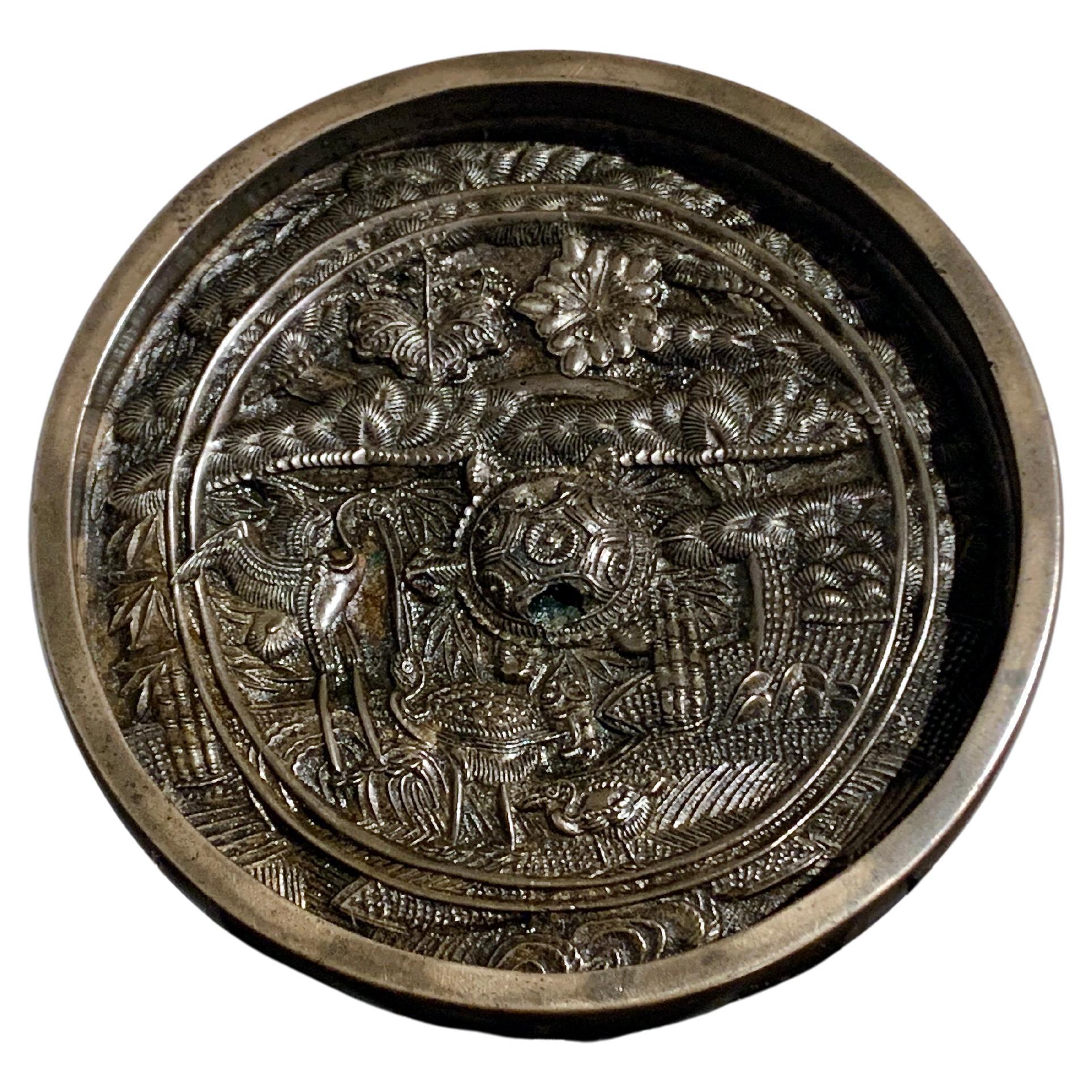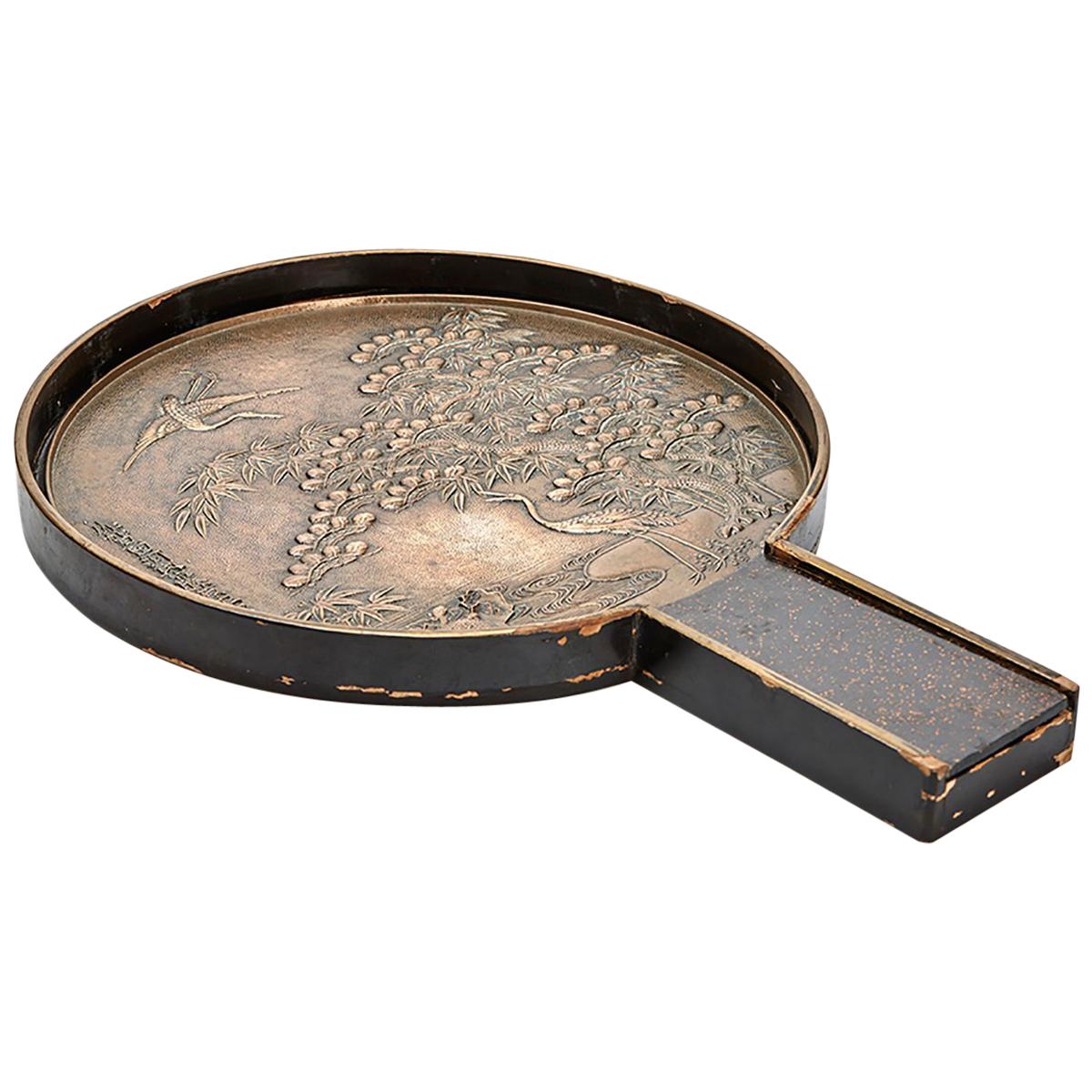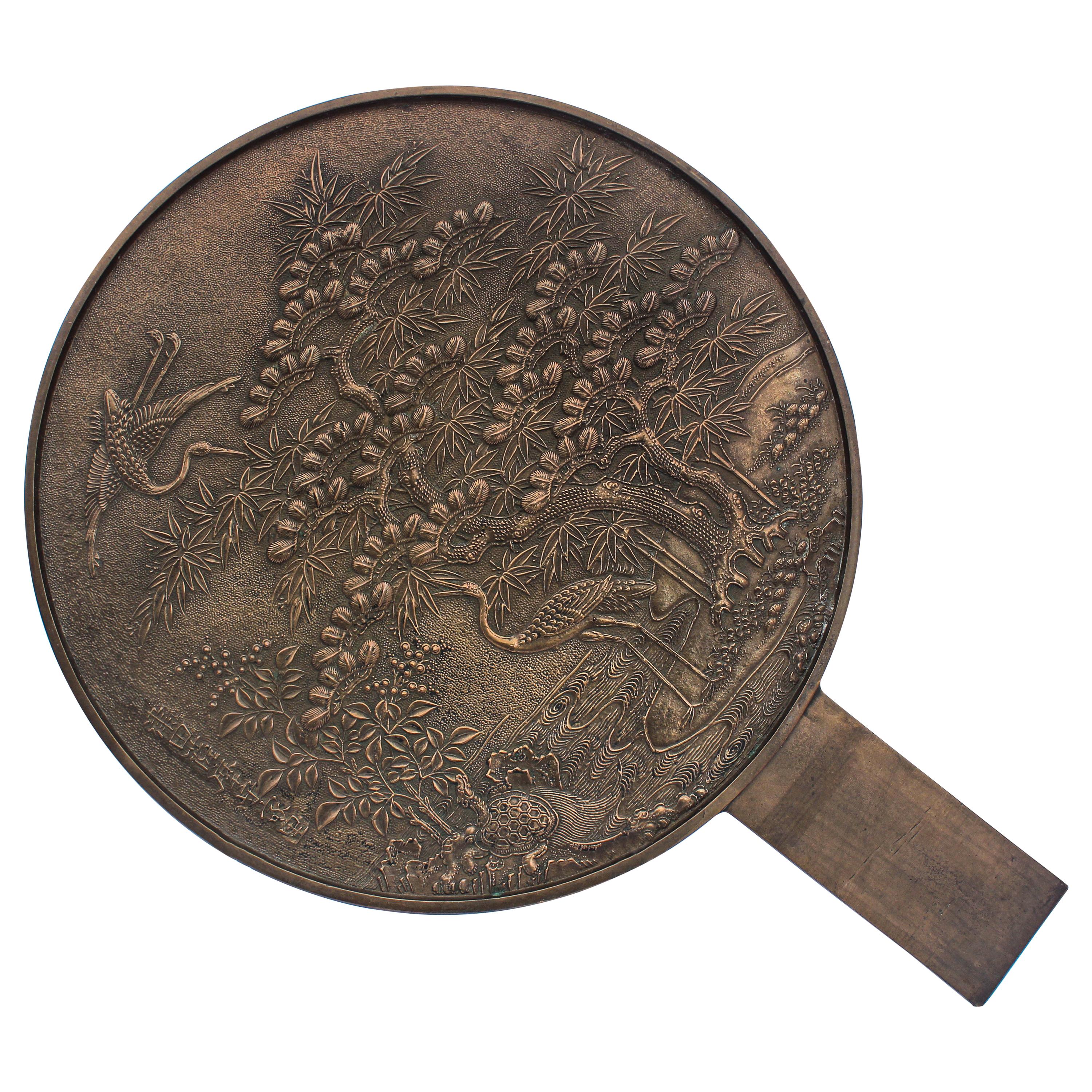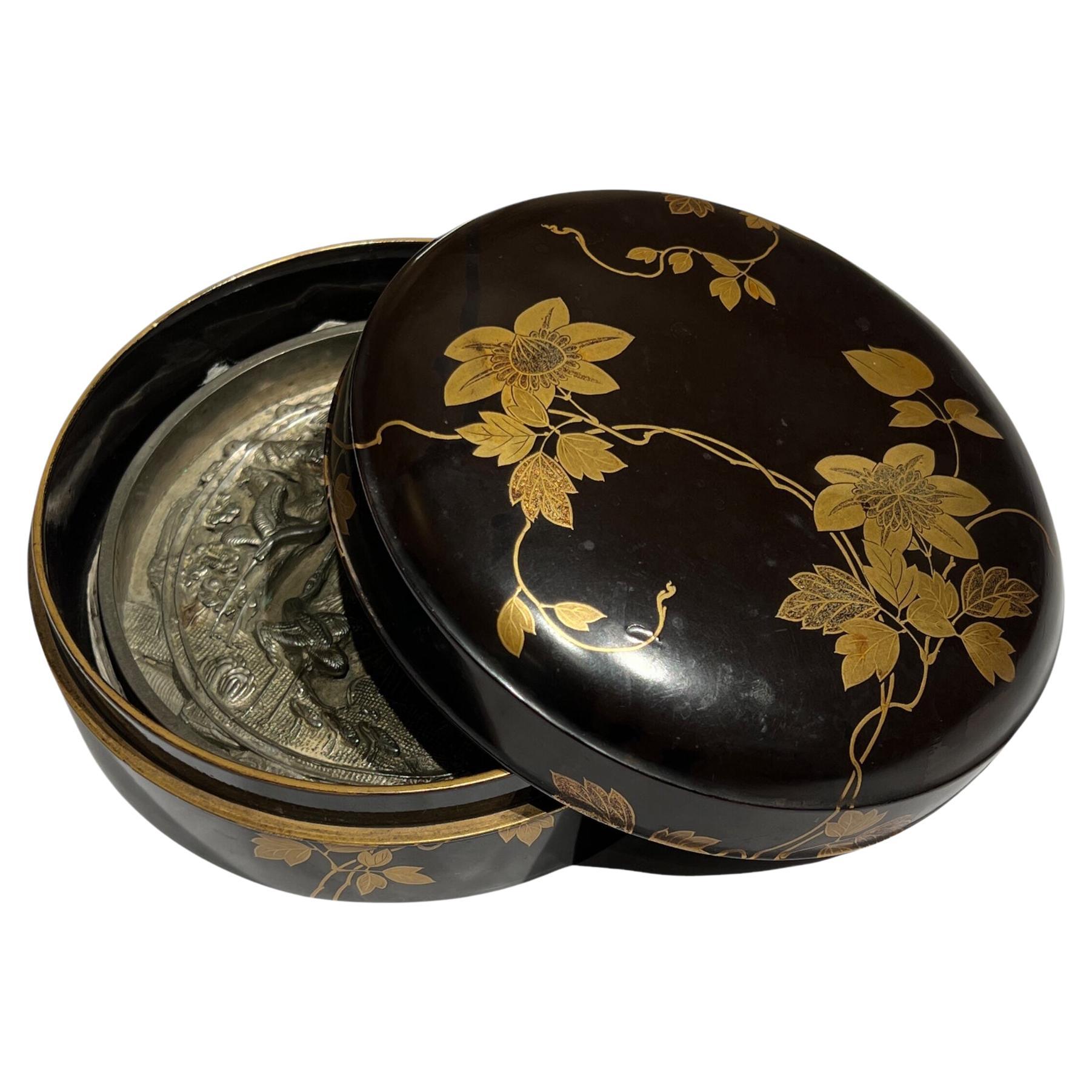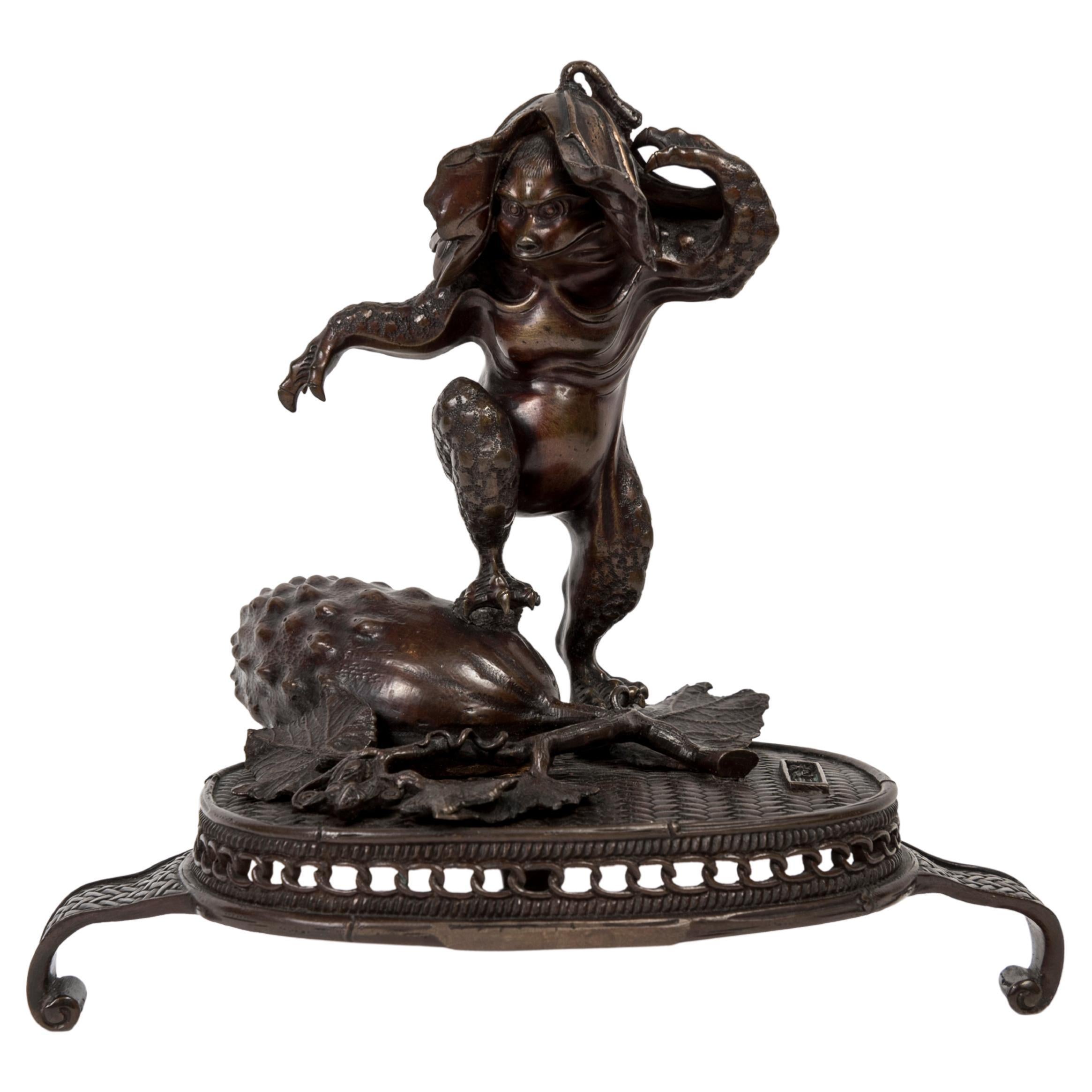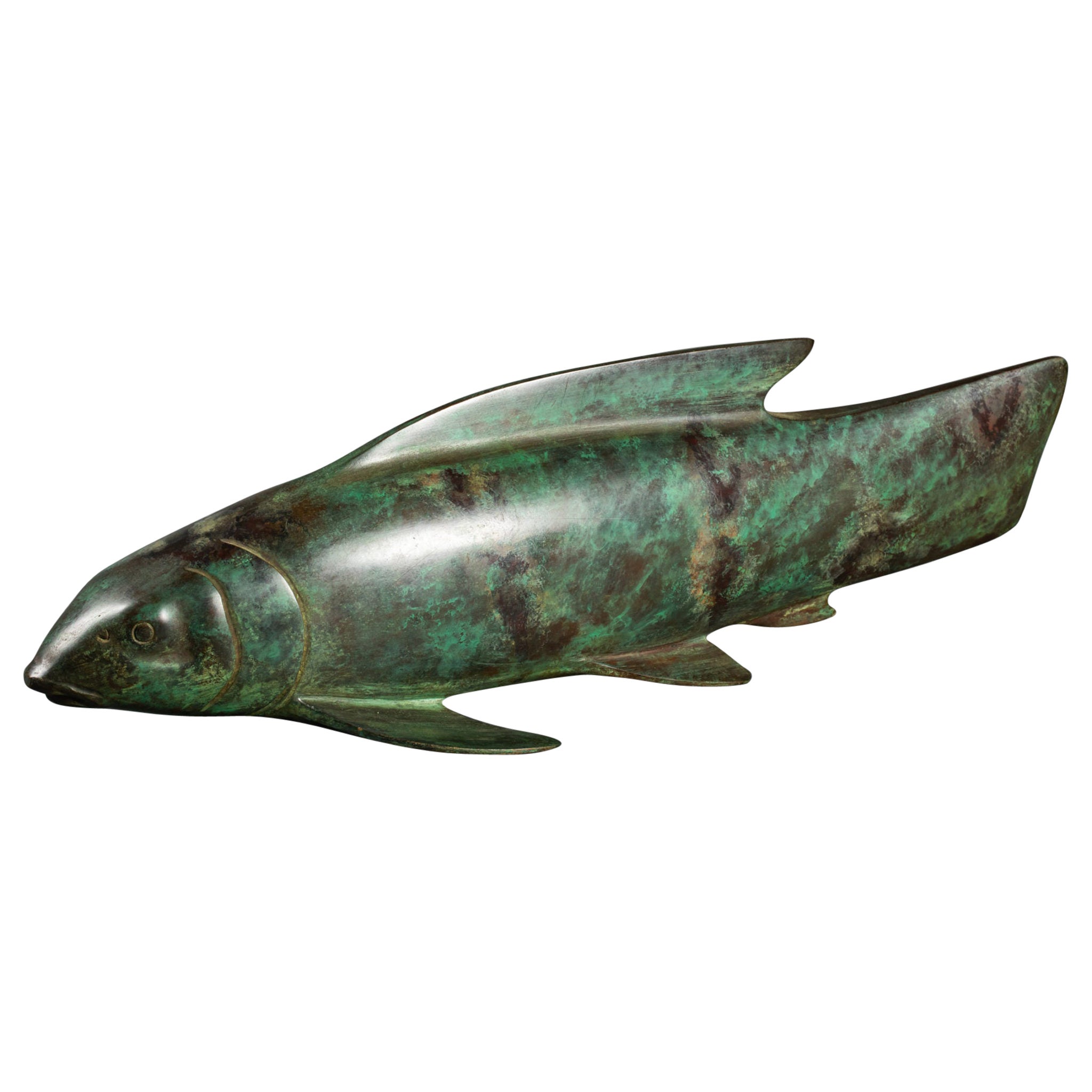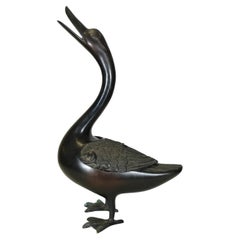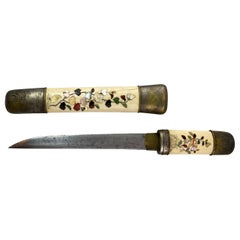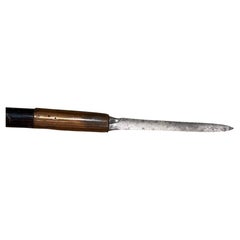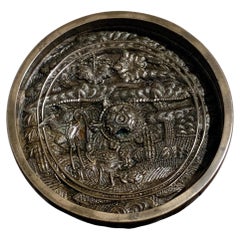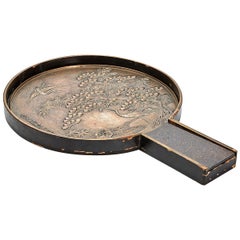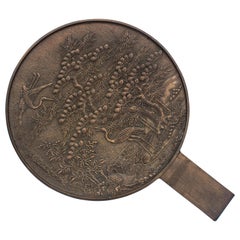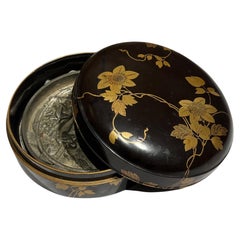Items Similar to Japanese bronze mirror
Want more images or videos?
Request additional images or videos from the seller
1 of 9
Japanese bronze mirror
About the Item
This exquisite Japanese bronze mirror, measuring approximately 11 cm in diameter, is a rare and enchanting piece of history. Dating back to the 19th century or earlier, it features an intricately designed surface adorned with a floral motif, showcasing delicate craftsmanship and the timeless elegance of Japanese artistry. The mirror's design is not only a functional object but also a piece of art that reflects the aesthetic sensibilities of a bygone era. The patina developed over time adds character and authenticity, making it a prized collectible for enthusiasts of antique Asian artifacts. Perfect for collectors or as a unique decorative accent, this mirror captures the essence of traditional Japanese culture and offers a tangible connection to its rich history.
- Dimensions:Height: 0.32 in (8 mm)Diameter: 4.22 in (10.7 cm)
- Materials and Techniques:Bronze,Cast
- Place of Origin:
- Period:
- Date of Manufacture:19th c or earlier
- Condition:Wear consistent with age and use.
- Seller Location:Stockholm, SE
- Reference Number:1stDibs: LU1006842703772
About the Seller
4.9
Recognized Seller
These prestigious sellers are industry leaders and represent the highest echelon for item quality and design.
Platinum Seller
Premium sellers with a 4.7+ rating and 24-hour response times
Established in 1989
1stDibs seller since 2013
105 sales on 1stDibs
Typical response time: 1 hour
- ShippingRetrieving quote...Shipping from: Stockholm, Sweden
- Return Policy
Authenticity Guarantee
In the unlikely event there’s an issue with an item’s authenticity, contact us within 1 year for a full refund. DetailsMoney-Back Guarantee
If your item is not as described, is damaged in transit, or does not arrive, contact us within 7 days for a full refund. Details24-Hour Cancellation
You have a 24-hour grace period in which to reconsider your purchase, with no questions asked.Vetted Professional Sellers
Our world-class sellers must adhere to strict standards for service and quality, maintaining the integrity of our listings.Price-Match Guarantee
If you find that a seller listed the same item for a lower price elsewhere, we’ll match it.Trusted Global Delivery
Our best-in-class carrier network provides specialized shipping options worldwide, including custom delivery.More From This Seller
View AllJapanese insense burner. 19th c.
Located in Stockholm, SE
This 19th-century Japanese bronze incense burner is finely cast in the shape of a duck with an elegantly arched neck and open beak, a symbol of longevity and peace in Japanese cultur...
Category
Antique 19th Century Japanese Metalwork
Materials
Bronze
Japanese Tanto, 19th c
Located in Stockholm, SE
A nicely designed Japanese Tanto with a bone scabbard that has inlays of stones and mother of pearl. Motives of flowers and birds.
Category
Antique Late 19th Century Japanese Metalwork
Materials
Iron
Japanese sword, Tachi. 19th c
Located in Stockholm, SE
A Japanese sword, army-mounted from the 19th c. The blade with signature.Fuchi Kashira of gilt copper and the handle with skin of ray under the twisted b...
Category
Antique 19th Century Japanese Metalwork
Materials
Iron
Japanese Spear, Edo Period, bears signature
Located in Stockholm, SE
A Japanese long spear. Partly lacquered wood with a forged spearhead which is signed. High quality as most of Japanese items.
Provenance: early 20th century Swedish collection.
Category
Antique 19th Century Japanese Metalwork
Materials
Iron
Pair of Japanese urns. 19th c. Meiji period. Signed.
Located in Stockholm, SE
These pair of Japanese bronze urns from the Meiji period have decorations of birds and flowers. The inlays are made of silver, gilt bronze and shakudo. Both urns are signed at the bo...
Category
Antique Late 19th Century Japanese Metalwork
Materials
Bronze
Japanese vase with French gilt bronze mountings. 19th c.
Located in Stockholm, SE
This exquisite 19th-century Japanese porcelain vase is a superb blend of Eastern craftsmanship and European opulence. The body is decorated in delicate blue and beige glaze featuring...
Category
Antique 19th Century Japanese Vases
Materials
Bronze
You May Also Like
Japanese Cast Bronze "Longevity" Mirror, Edo Period, 18th Century, Japan
Located in Austin, TX
A heavy and finely cast Japanese bronze mirror with longevity symbols, Edo Period, 18th century, Japan.
The small, round mirror with high walls...
Category
Antique Late 18th Century Japanese Edo Metalwork
Materials
Bronze
Antique Japanese Meiji Bronze Mirror 19th Century
Located in Bishop's Stortford, Hertfordshire
An exceptional and stunning Japanese bronze handled mirror within a fitted black lacquered case. The mirror is polished to one side with the other s...
Category
Antique 19th Century Japanese Meiji Metalwork
Materials
Bronze
19th Century Oriental Bronze Japanese Kagami Handled Mirror
Located in North Hollywood, CA
Antique traditional Oriental bronze Japanese Kagami handled Mirror.
An exceptional and stunning Japanese bronze handled mirror called Kagami.
Large and heavy bronze handle mirror ...
Category
Antique Late 19th Century Japanese Meiji Metalwork
Materials
Bronze
Japanese Cast Bronze Mirror and lacqer box, Edo Period, 18th Century, Japan
Located in PARIS, FR
A heavy and finely cast Japanese bronze mirror decorated with pines , cranes wich are longevity symbols, The handle in the center is a a tutle which also symbolize longevity.
Edo Period, 18th century, Japan.
The small, round mirror with high walls has been intricately and exquisitely cast with symbols . The turtle has a domed shell pieced to allow a cord to be strung through for handling or hanging.
A five charactesr mark is cast on the border.
Mirror is 12 ,3 x 1,6 cm
Box is 14,2 x 5 cm
Surrounding the turtle and inscription is a densely cast landscape featuring pine trees with fantastic needles, two cranes with their 3 youngs, dense stalks of leafy bamboo. and a blooming prunus on the left side.
All are symbols of longevity. Bamboo also symbolizes resilience and prosperity. Bamboo asociated with prunus and pine are called the 3 frinds of winter.
The other side of the mirror is undecorated, and would originally have been highly polished, allowing the user to see their reflection in the polished surface.
The bronze with a wonderful, warm silver patina.
This mirror is presented in its original lacquer box , hand decorated in the Kodaiji style with gold lacquer flowers...
Category
Antique Late 18th Century Japanese Japonisme Metalwork
Materials
Bronze
Japanese Bronze Kappa
Located in PARIS, FR
Dark brown patina bronze figure of a standing kappa with its right leg leaning on a cucumber. The figure is put on four-legged rattan-like bronze stand.
The kappa (??) is a aquatic creature taken from Japanese folklore having the appearance of an anthropomorphic turtle.
His skull is either slightly hollowed out to accommodate water, from which it derives its power, or hidden with a water lily leaf hiding this sag. Naturally polite, it is advisable to bow to him in order that it should do so in return, thus losing all the water he has gathered and leaving it harmless.
Kappa has the reputation of attempting to lure both humans and animals into the water. In some areas, it ravages fields, stealing eggplants and cucumbers. Some people prefer to worship it and give it offerings rather than be its victims.
Signed Shokaken (???). His real name is Ôshima Yasutarô. He was born in 1849 and is the third generation of a metalworkers family. Together with his brother Ôshima Joun...
Category
Antique Late 19th Century Japanese Metalwork
Materials
Bronze
$5,223
Japanese Bronze Carp
Located in Hudson, NY
Original signed wooden box. Signature reads: Ryohei Saku. Outside of box reads: Ota Ryohei saku. Notes about the artist: Ota Ryohei (often spelled Oota Ryohei), 1913-1997, was born i...
Category
Mid-20th Century Japanese Metalwork
Materials
Bronze
$11,500
Recently Viewed
View AllMore Ways To Browse
Antique Bronzes
Bronze Measure
Antique Bronze Mirror
Japanese Cast Bronze
Bronze Artifacts
Floral Bronze Mirror
Antique Japanese Mirrors
Gold Mirror Asian
Japanese Artifact
Ray Crook
Samurai Stirrups
Swords Damascened
Tibet Pots
Tibetan Incense Burner
Bronze Chinese Wine Cup
Bronze Ikebana Baskets
Cast Bronze Teapot Japan
Cloisonne Tiger
